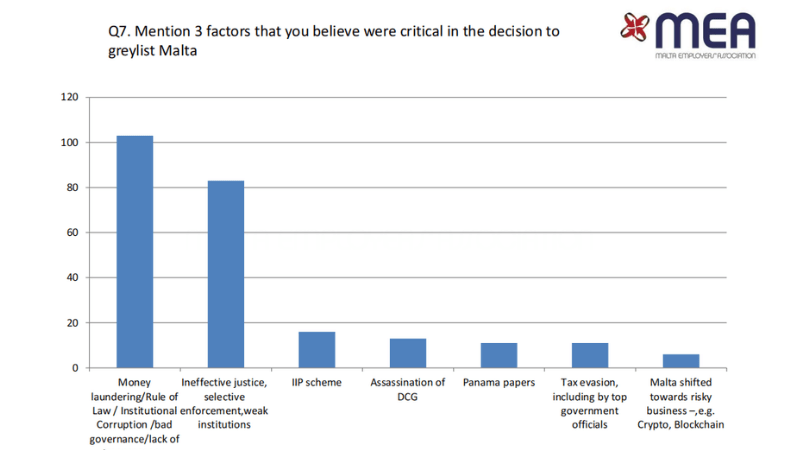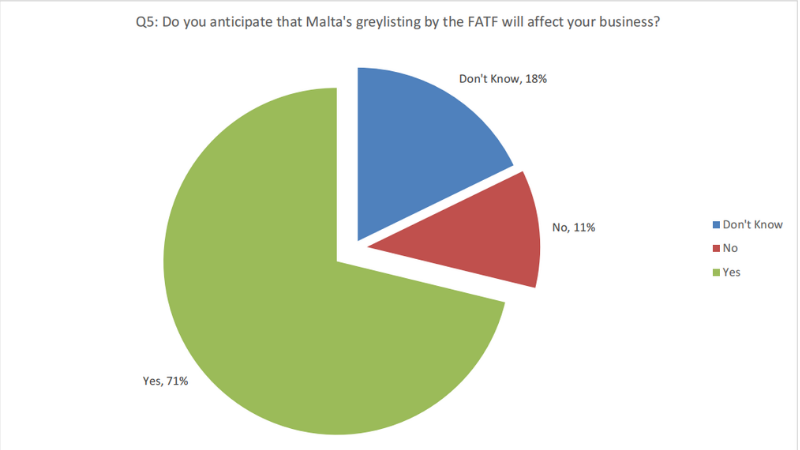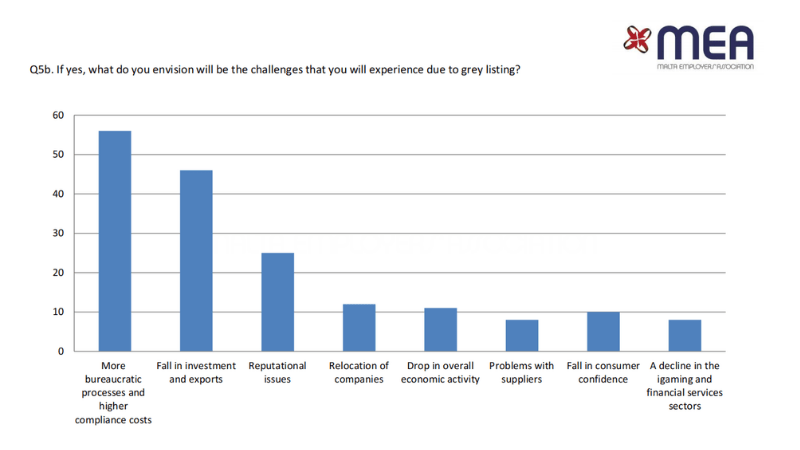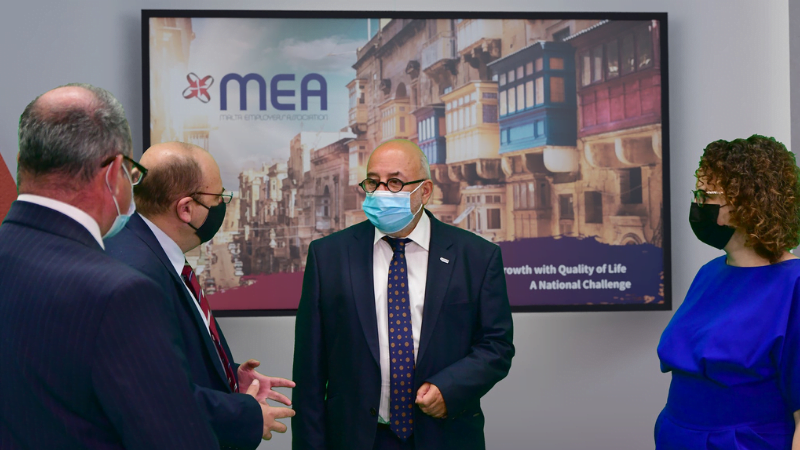When employers were asked why they thought Malta was greylisted by the FATF two weeks ago, more than 100 companies pinned the blame on Malta’s deficiencies in terms of preventing money laundering, enforcing rule of law across the board, institutional corruption and an overall lack of transparency.
A survey conducted by the Malta Employers Association (MEA) also revealed that more than half of the companies have already faced increased compliance costs and are expecting to face even more as a direct result of Malta’s greylisting. Over 50 companies said they expected costs associated with compliance and bureaucratic barriers to increase due to the greylisting.
A larger share of respondents, 72%, already reporting increased costs throughout 2020 as a result of new laws that were put in place throughout the Moneyval assessment, held before the FATF’s final ruling.

Reasons why Malta was greylisted, according to local employers. Source: MEA
When asked whether MEA places any faith in the government’s ability to prosecute high profile money laundering cases, director-general Joseph Farrugia said, “the government must send strong signals” to turn around Malta’s position on the FATF’s list of jurisdictions under increased monitoring.
“I would say that not all politicians in Malta are corrupt, but unfortunately those who do their work genuinely and diligently are being put in the same basket as those who are facing allegations of corruption,” Farrugia said.
“This also applies to businesses and the effects they are feeling because of the greylisting. When it comes to institutional corruption, it’s problematic when we have a situation where businesses can’t tell whether they will succeed or not due to the lack of a level playing field,” he explained.
“Legitimate companies are disadvantaged by others who get business proposals falling in their laps without working for it via direct orders, for example,” Farrugia added while pointing out that the MEA has been repeatedly vocal about public procurement issues over the years.
“This is where corruption flourishes; if you end up believing that this is the only way of succeeding, such practices become normalised, causing bigger problems,” he added.
The survey, held during the last week of June, reveals that 64% of employers are fearing ‘a strong impact’ on Malta’s overall economy as a result of the greylisting. Over 70% admitted they were also worried about a similar impact on their own, individual enterprises.

Source: MEA
Such an impact, the employers believe, will be felt in other areas besides compliance costs and increased bureaucracy.
Forty-five companies reported they were expecting a drop in investment and exports, with 25 respondents also indicating expected issues with Malta’s reputation as a jurisdiction.

A visual representation of the reasons why Malta was greylisted, according to employers. Source: MEA
46% of respondents felt that this impact will be felt more forcefully within the next three to six months, with the financial services sector reporting the highest level of added scrutiny and costs among all respondents (89% of financial services companies).
Besides Malta’s issues with prosecutions of high profile money laundering cases, institutional corruption and selective, weak justice system, respondents also flagged Malta’s golden passports scheme (19 respondents), the assassination of Daphne Caruana Galizia (15) and the Panama papers leak (10), which led to the FATF’s decision to greylist Malta.
When employers were asked to provide recommendations on how Malta should go about clearing its name from the grey list, both the respondents and MEA unequivocally called for a more trustworthy judiciary system (72 respondents), prosecutions across the board (52) as well as increased transparency in terms of public appointments (42) and resignations of officials implicated in corruption (38).
“If you have a decisive government with political will that admits that there were problems but will address them and take action, our country will be able to change its route, go out of greylisting and people will want to invest and do business with us again,” Farrugia said.
“The biggest threat isn’t the greylisting itself; it’s the conditions that caused it,” he concluded.















Excellent synopsis of all that is wrong at the moment.
At the risk of sounding like a broken record, I fear that there is no realistic chance of the Maltese judiciary system being capable of bringing successful prosecutions against all those identified in the numerous scandals where the public purse has been pillaged for the benefit of the untouchables.
The Moneyval Rapporteur, Pieter Omtzigt said it all last December when he said years after the Panama Papers and Daphne’s articles were in the public domain there was and still is not a single successful prosecution!
Read into that what you will…
All these companies took advantage of the government business at all costs model.
They had not problem with tax and VAT avoidance, employing migrates and paying them peanuts. Lack of health and safety, planning, and the hundreds of money laundering restaurants and shops.
They thrived, put their faces on bill boards and were happy that the government promoting banks the likes of Sstabank, Pilatus etc to enable money laundering, they had no problem with people of trust running all entities which should make sure rules are followed, to make they are not.
There was no rules of law and institutions were compromised.
They enjoyed the full pleasures of L-Aqwa Zmien like teenage lovers having free sex.
Unfortunately there are consequences, they all looked for the instant gain, nobody looked up and thought about tomorrow.
I hope you enjoy the fruit of you “labours” !
I’d like to the see the questionnaire as I’m fairly certain this is a misrepresentation of the facts. The first column in the bar chart should surely read ‘Letter written by PN / may comments by traitors of Malta’?
Is there anyone who actuallly believes the government that who brought this upon the nation can dig it out back out of it? As for honest politicians, that statement is generous at best.